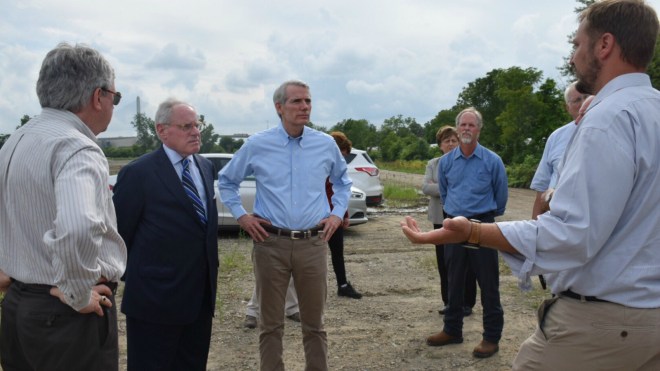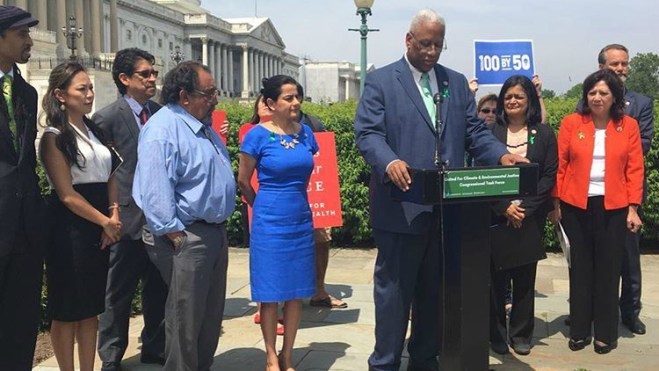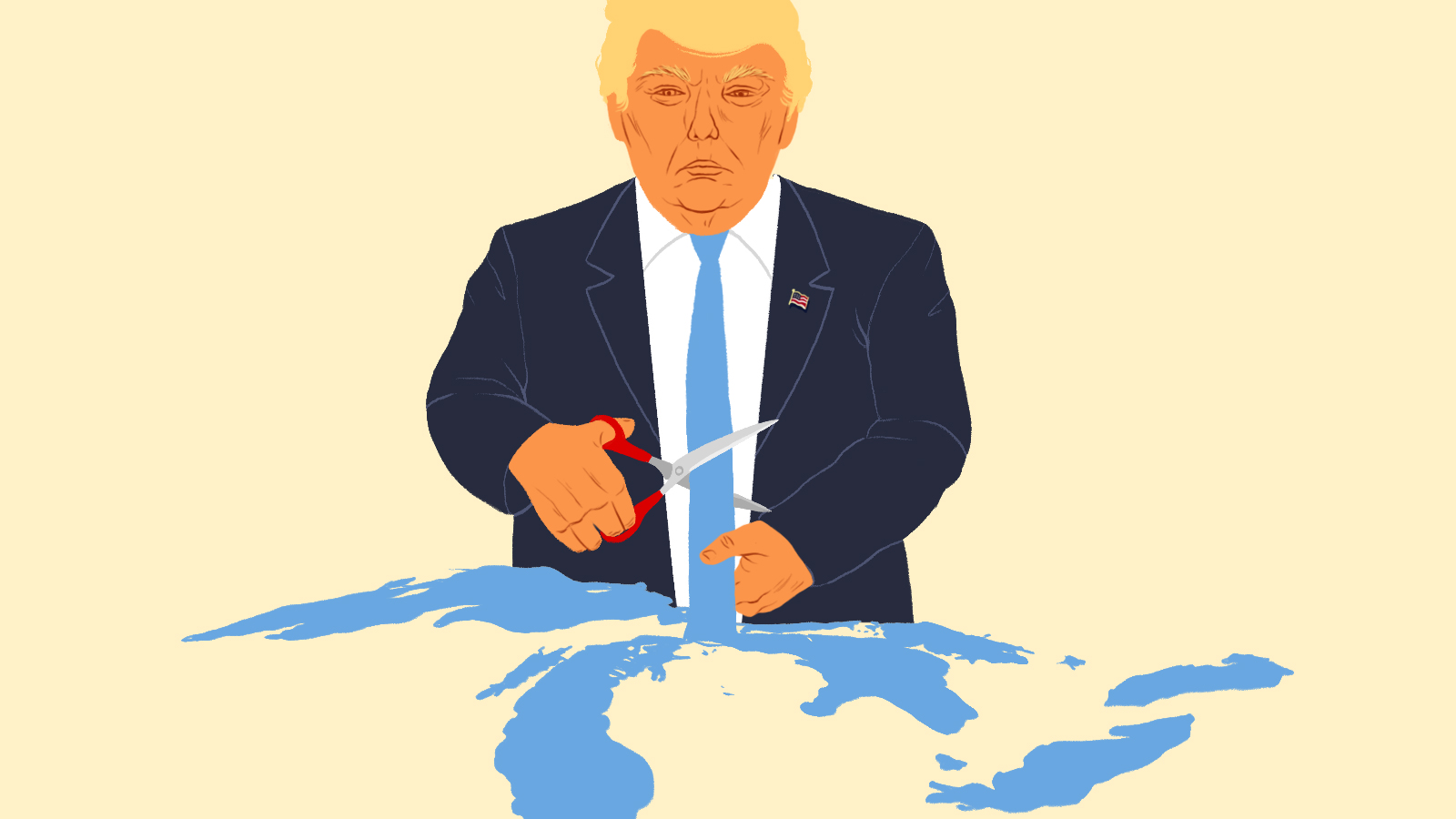No one’s going to mistake Ohio Sen. Rob Portman for a climate hawk. He’s the kind of Republican pol who tries to have it both ways — not outright rejecting the scientific evidence, but also not voting to do much about it. He’s also fine with spending boatloads of polluter money running for reelection.
But when it comes to the health of the Great Lakes, which provide his state with significant economic benefits and hold 20 percent of the world’s freshwater, Portman doesn’t mess around. So this spring, when the Trump administration proposed slashing local cleanup efforts, Portman rushed from Capitol Hill to Cleveland to discuss saving nearly $300 million for the Great Lakes Restoration Initiative.
“We have a fight on our hands,” Portman told local leaders, claiming he was blindsided by the proposed cuts. His vote to confirm controversial new Environmental Protection Agency Administrator Scott Pruitt was made, in part, based on a pledge for continued initiative funding. Oops.

Ohio Sen. Rob Portman (center) meets with officials from the Great Lakes Dredged Material Center for Innovation last year. (Rob Portman)
The Great Lakes cuts were part of a dramatic proposed reduction to the EPA that was included in President Trump’s so-called “skinny budget” — which would eliminate nearly a third of the agency’s $8 billion in total spending. The Great Lakes were far from the only victim. Other regional cleanup programs, including ones for the Chesapeake Bay, Gulf of Mexico, and Puget Sound, all face extinction, and the White House proposed gutting the Office of Environmental Justice, eliminating nearly 80 percent of its budget.
Mustafa Ali, former head of that office and an EPA employee for nearly a quarter-century, resigned ahead of the skinny budget’s release, sensing that the administration had no interest in protecting or restoring the clean air, water, and soil of vulnerable communities. Indeed, according to the Union of Concerned Scientists, the administration’s budget would cut local and state clean air and water grants, hamstring the EPA’s enforcement office, stymie efforts to clean up Superfund sites, and pass the buck on efforts to reduce pesticide and lead exposure. A Sierra Club campaign director called it “just racist.”
Robert Bullard, a professor at Texas Southern University known as the “father of environmental justice,” warns that the Trump budget would tear down the entire U.S. environmental protection apparatus. Low-income folks and communities of color would suffer the most, Bullard says — as always happens in these cases — but everyone would feel the negative impact.
“The harsh nature in which this administration is approaching issues of environment, health, energy, and community well-being,” Bullard says, “will be devastating for the larger society.”
But here’s the thing: By targeting specific regional efforts alongside more general environmental justice funding, the Trump administration might have inadvertently given opponents a means to fight back — and sparked unlikely alliances. It’s hard to imagine Portman making a stink over the elimination of Ali’s old office. But take Great Lakes money away, and he’s ready for a fight. So are other red state Republicans who recognize the value of local watersheds.
For that reason and others, Trump’s skinny budget is unlikely to become law. Presidents submit proposals annually, and Congress never rubber stamps the executive branch’s first offer. Already, Congress has parried one of Trump’s attempts to hamstring the EPA, trimming only 1 percent of the agency’s funding during the late-April budget fight that kept the government running until the fall.
But it’s going to take voices from both sides of the aisle to save portions of the $2.5 billion in EPA spending that are on the chopping block, especially the ones that aid the most vulnerable communities. And regional water-source cleanup programs, which offer huge economic benefits, provide a means to build those broad coalitions — and create a united opposition.
If some or all of those funds can be clawed back, they could prevent many vulnerable communities from falling even deeper into distress. “We can’t afford anything that threatens efforts to keep these bodies of water clean,” says Donele Wilkins, president and CEO of the Detroit-based environmental justice organization Green Door Initiative.
Many of the arguments for cutting environmental protection — particularly programs that promote justice — focus on letting the states take the lead. But Bullard notes that the federal government had to step in when states failed to protect frontline communities. State-level decision-making could also result in radically different treatment between traditionally blue states and red ones.
“Just putting it to states is not going to guarantee it’s getting done,” says Rachel Cleetus, climate policy manager at the Union of Concerned Scientists. “When it comes to environmental justice, one of the harsh realities that experience shows is those voices are not represented well enough in our national discourse and policy sphere.”
In late April, three freshman Democratic House members announced that they had formed the United for Climate and Environmental Justice Task Force. Nanette Diaz Barragán of California (a 2017 Grist 50 honoree), Pramila Jayapal of Washington, and Donald McEachin of Virginia pledged to fight to protect the fundamental rights of all Americans to clean air and water.
“We don’t need more Flint, Michigans,” McEachin says. “We don’t need the higher risks of chemical spills in low-income areas. I will continue to fight for adequate funding so that all communities have safe water, clean air, and are prepared to address the impending climate change issues.”

Donald McEachin speaks at the introduction of the United for Climate and Environmental Justice Task Force in April. (Donald McEachin)
An earnest Republican attempt to pass Trump’s skinny budget is expected to come on Oct. 1, the beginning of the federal government’s 2018 fiscal year. And bipartisan muscle will likely be needed to prevent it.
To that end, McEachin — whose district reaches from the southwestern suburbs of Richmond to coastal towns, including Newport News — joined a congressional coalition dedicated to making sure that the $70 million in Chesapeake Bay funding on the chopping block is spared. He says the watershed is critical for Virginians of all races and income levels. He’s been joined by colleagues far to his right, including Rep. Andy Harris, a Maryland Republican, who calls the Chesapeake “a treasure.”
Portman, for his part, has joined an alliance to retain Great Lakes funding. It includes lawmakers from Michigan, Minnesota, New York, Ohio, Pennsylvania, and Wisconsin. In early May, Sen. Debbie Stabenow, a Michigan Democrat, claimed victory for that bipartisan effort by holding onto Great Lakes Restoration Initiative funding for the remaining five months of the 2017 fiscal year; $50 million had been targeted by the Trump administration to help build the much-ballyhooed border wall.
But the White House still plans to zero out the nearly $300 million-per-year Great Lakes project in 2018.
“Everything about the Great Lakes is really who we are,” Stabenow said in a video message to her constituents. “We’ve got to make sure that we do everything possible to protect full funding for our Great Lakes.”
Rallying around these regional programs might be the best bet for environmental justice advocates to preserve support from the federal government for their communities.
“The phrase ‘environmental justice’ seems to drive the entire Republican right crazy,” says Vernice Miller-Travis, a Baltimore-based environmental consultant and cofounder of WE ACT, an EJ organization in West Harlem. But local water issues can bridge that divide.
Most of the bodies of water addressed in regional remediation efforts seed tributaries that carry drinking water to large inland populations, so their impact goes far beyond coastal communities. The Great Lakes, for instance, provide water not just for Chicago and Cleveland, which sit on Lake Michigan and Lake Erie, respectively, but also Detroit, via the Detroit River.
Donele Wilkins of Detroit’s Green Door Initiative has spent a lot of time and effort fighting industrial facilities that dump in the Detroit River. That dumping results in constant beach closures; recently, her community was told not to drink tap water for several days because of contaminants that even boiling couldn’t remove.
Wilkins says it’s clear to her that the concerns of environmental justice communities are going to fall on deaf ears with the current administration, as well as most Republican members of Congress. She gets that, for the moment, it just isn’t a priority of the federal government.
But keeping the bottom from falling out is almost as important as making the improvements she and her neighbors desperately seek — and that means that anyone fighting to keep the Great Lakes pristine is (temporarily) with her.
“I’ve been in this movement long enough that I know you have to let go of what people’s motives are,” Wilkins says. “You can’t legislate the heart of people.”



